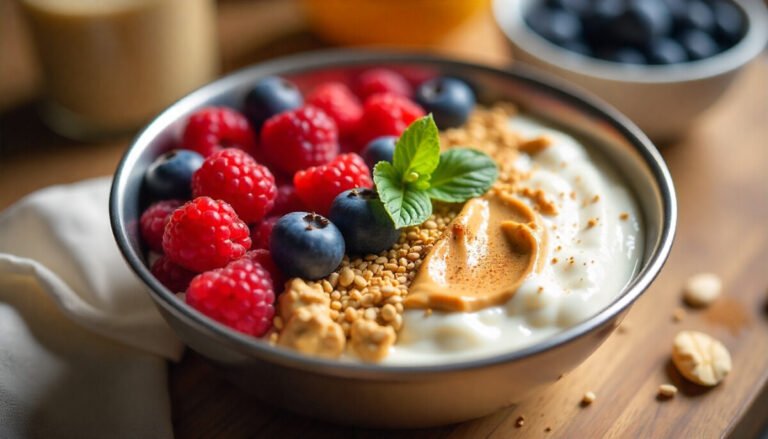If your goal this year is to lose weight, feel energized, and avoid mid-morning crashes, your breakfast choices matter more than you think. Starting your day with enough protein not only keeps you full longer but also helps stabilize blood sugar, supports muscle recovery, and prevents overeating later in the day. In fact, research shows that people who include 25–35 grams of protein at breakfast report higher satiety and better weight management compared to those who rely on carb-heavy meals. A protein-rich breakfast gives you steady energy, which is especially important if you’re balancing work, workouts, or just a busy lifestyle in 2026.
Best Sources of Breakfast Protein

Here are some protein-packed ingredients you can rotate into your morning meals:
Eggs & egg whites – versatile and easy to cook.
Greek yogurt or Skyr – thick, creamy, and almost double the protein of regular yogurt.
Cottage cheese – pairs well with fruit or whole-grain toast.
Lean poultry or turkey bacon – a lighter alternative to traditional bacon.
Tofu & tempeh – excellent plant-based options.
Protein powders (whey, pea, or soy) – quick, convenient, and perfect for smoothies.
Seeds & nuts – chia, hemp, almond butter, or peanut butter for added nutrition.
7 High-Protein Breakfast Recipes for 2025
Here are some easy, delicious, and balanced recipes you can try:
1. Protein-Packed Veggie Omelette

3 whole eggs + 2 egg whites
Spinach, mushrooms, bell peppers
Low-fat cheese or feta
1 slice of whole-grain toast
About 32g protein
2. Greek Yogurt Power Bowl

1 cup plain Greek yogurt
1 tbsp chia seeds
½ cup berries
1 tbsp almond butter
About 28g protein
3. Tofu Scramble with Avocado

½ block firm tofu, crumbled
Turmeric, garlic, onion
Spinach & zucchini
½ avocado on the side
About 26g protein (vegan friendly)
4. High-Protein Overnight Oats

½ cup oats
1 scoop protein powder (vanilla or chocolate)
1 cup almond milk
1 tbsp peanut butter
Banana slices
About 30g protein
5. Cottage Cheese & Fruit Bowl

1 cup low-fat cottage cheese
½ cup pineapple or mango
1 tbsp hemp seeds
About 27g protein
6. Turkey & Egg Breakfast Wrap

Whole-grain tortilla
2 scrambled eggs + sliced turkey breast
Spinach & tomato
Salsa for flavor
About 35g protein
7. Protein Smoothie for On-the-Go

1 scoop whey or plant protein powder
1 cup unsweetened almond milk
½ banana
1 tbsp peanut butter
Handful of spinach
About 29g protein
Extra Tips for Weight Loss & Energy
Balance macros: Pair protein with fiber and healthy fats for lasting fullness.
Stay hydrated: Drink a glass of water with breakfast—it improves digestion and metabolism.
Limit sugar: Avoid sugary cereals, pastries, or drinks that spike blood sugar.
Plan ahead: Prepping overnight oats or smoothie packs makes it easier to stay consistent.
For more science-backed insights, check out this helpful guide from Healthline on high-protein breakfasts.
Final Thoughts
In 2026, if you want a breakfast that helps you lose weight, stay energized, and feel full all morning, aim for at least 25–35 grams of protein. With the right recipes and ingredients, high-protein breakfasts don’t have to be boring or repetitive—they can be quick, delicious, and customized to your lifestyle.
Frequently Asked Questions (FAQ)
1. Is a high-protein breakfast good for weight loss?
Yes. Eating 25–35 grams of protein in the morning can reduce cravings, control appetite, and help prevent overeating later in the day—making it easier to lose weight.
2. How much protein should I eat at breakfast?
Most experts recommend 25–35 grams of protein for breakfast to maximize fullness and energy while supporting muscle health.
3. Can I have a high-protein breakfast if I’m vegan?
Absolutely. Plant-based options like tofu scrambles, tempeh, edamame, lentils, and plant protein powders make excellent vegan-friendly high-protein breakfasts.
4. What is the best quick high-protein breakfast for busy mornings?
A protein smoothie with whey or plant protein powder, almond milk, banana, and peanut butter is fast, filling, and portable.
5. Can high-protein breakfasts improve energy levels?
Yes. Protein slows digestion and keeps blood sugar stable, which helps maintain steady energy throughout the morning instead of an early crash.
6. Are protein powders safe to use daily?
Most protein powders are safe in moderation. Choose high-quality brands with minimal additives. If you have health concerns, consult a nutritionist or doctor before daily use.
7. Do high-protein breakfasts help with muscle building?
Yes. Protein supports muscle recovery and growth, especially if you work out regularly. A protein-rich breakfast helps distribute your daily intake more evenly.




